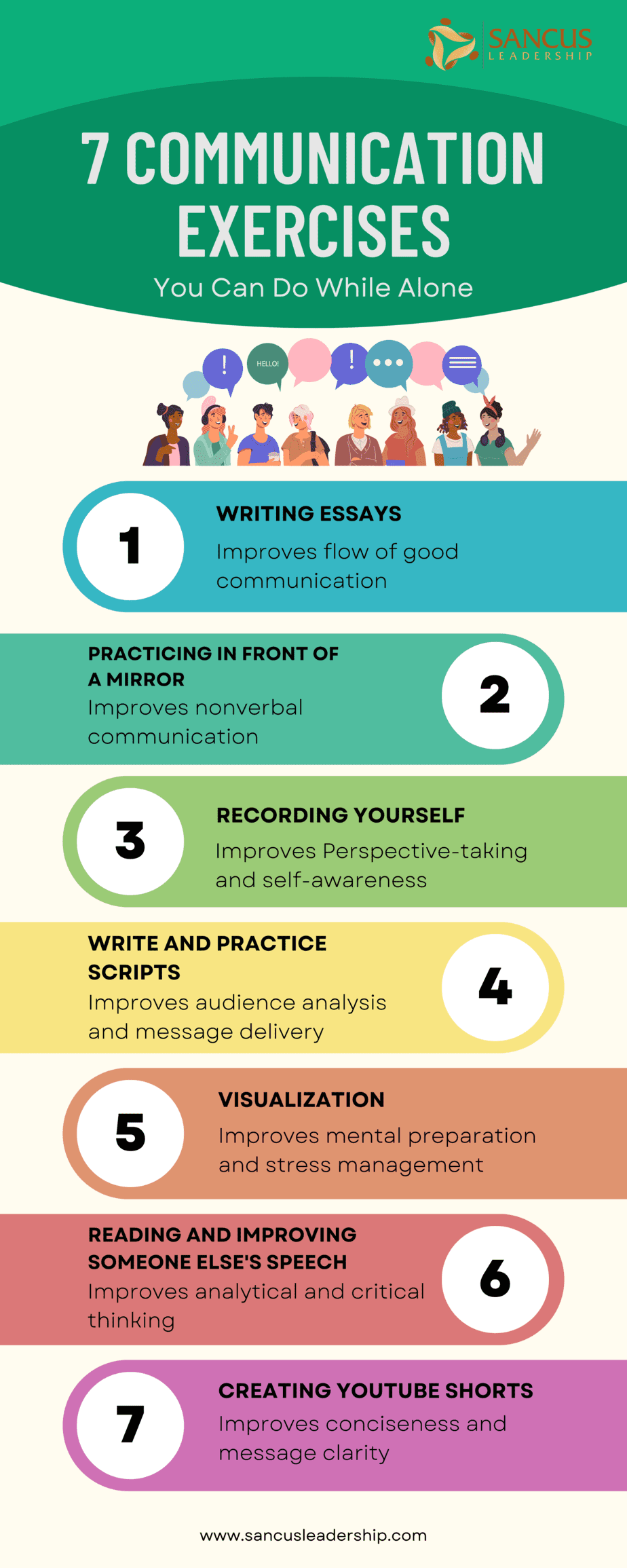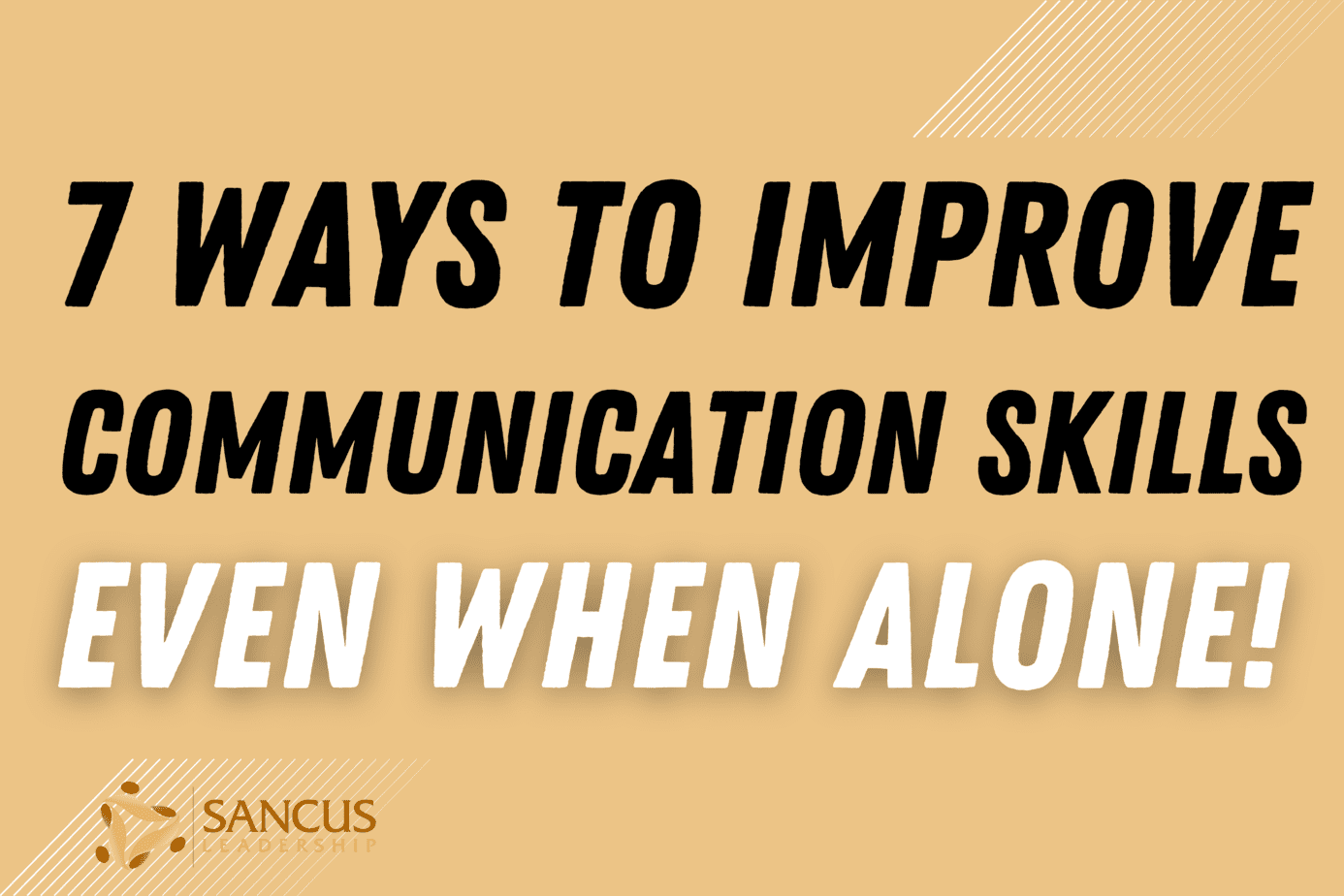Communication consists of three components: Verbal Messages – the words we choose; Para-Verbal Messages – how we say the words; and Nonverbal Messages – our body language. So how do you improve communication without anyone around to help you?
The best way to practice communication alone (with or without talking) is by writing essays, creating youtube shorts, visualization, recording yourself, and role-playing. You’ll find how to perform these exercises below in the article.
What is really the importance of language in small team leadership?
Only Practicing Communication With Other People

One big mistake I often see is that people think they need a training partner to improve their communication skills or that they can only improve by interacting with others in real time.
This is entirely backward. If we don’t take the time and intention to thoroughly understand our communication and how we would like to speak our words, then we are missing some great opportunities for improvement.
If we don’t take the time and intention to thoroughly understand our communication and how we would like to speak our words, then we are missing some great opportunities for improvement.
One of my favorite communicators is Jordan B Peterson. He can take an incredibly complex topic and make it tangible and easy to understand through stories and visual imaging.
You can check out Jordan’s communication skills in this Youtube talk.
This ability to make visions or ideas tangible and understandable is a primary skill for anyone who wants to become a successful leader. If you can’t present a future that your team can understand, how will they be able to work toward it?
Jordan was once asked how he could communicate effectively. His answer was simple: I write a lot, I really do; I write tons.
To effectively communicate ideas, we must first understand them ourselves. Then, we can continue toward the best way to visualize them and how we want to verbalize them. But it all starts with us fully understanding the topic.
To effectively communicate ideas, we must first understand them ourselves.
Writing is one of the best ways to improve your leadership!
Consequences of Not Practicing Communication Alone

If we take the time to practice alone, we will take advantage of ample opportunities and speed up our progress toward becoming better communicators. The problem with training communication solely together with others is that we are not fully able to focus on our own development. We must share our attention with the people to whom we are speaking, and it is tough to both listen to what someone else is saying and also listen to what you are saying.
If we take the time to practice alone, we will take advantage of ample opportunities and speed up our progress toward becoming better communicators.
People who don’t take the chance to practice their communication skills alone tend to be overly dependent on other people’s opinions and ideas. This is a great way to stay average, but not sufficient if you want to become a great leader and a great communicator. For that, you need to be innovative and adaptable.
Benefits of Practicing Communication Alone

Once you start practicing alone, you’ll quickly see an increase in performance. You will be able to spend as much time as you need on each specific aspect (verbal, para-verbal, nonverbal). This usually means fewer questions after your PowerPoint or more profound ones, showing that the audience understands the topic.
Great communicators also increase engagement with their audience. So you will likely see more challenging statements and people coming up to you after the meeting asking you questions.
Practicing alone also makes it risk-free to experiment with our ways of communicating. If you show up at work each day with a new communication style and way of framing things, people might think you have gone crazy.
Which, to be fair, is a reasonable estimate. 😉
Jokes aside, finding a place where you can challenge the limitations of your voice and be someone different for a few minutes is incredibly powerful. It is the same thing that professional athletes do; they have situations where they are alone, focusing on a single act such as shooting or passing.
Finding a place where you can challenge the limitations of your voice and be someone different for a few minutes is incredibly powerful.
This gives them a space to try new things without worrying about what others think.
I think it is also worth noting that once you start to truly listen to your own words and your own thoughts, you will also develop a better sense of self-awareness. And self-awareness has so many benefits, especially in communications. It is common knowledge nowadays that self-awareness is a vital building block when developing self-managing, which in itself is the stepping stone to outstanding leadership.
How to Practice Communication Alone

Now that we know that to be good communicators, we need to practice alone. Let’s go through some great exercises that you can do.
| Exercise | Nonverbal | Verbal | Para verbal |
|---|---|---|---|
| Write essays | X | ||
| Practice in front of a mirror | X | X | X |
| Record yourself | X | X | X |
| Write and practice scripts | X | ||
| Role-playing | X | X | X |
| Visualization | |||
| Read and improve a speech | X | ||
| Create Youtube shorts | X | X | X |
- Writing essays allows you to fully stand the flow of good communication. It starts with a hook and then takes you on a journey to the conclusion.
- Practicing in front of a mirror allows you to get instant feedback and detect nervous movements or awkwardness.
- Record yourself during an event or during your practice is a great way to study the details from another person’s perspective.
- Write and practice scripts. Go through your next presentation and write a script on how you want to present it; think about the audience’s needs and wants.
- Visualization is a great way to prepare mentally for a presentation or speech. It allows you to live the situation before it has happened and therefore relieves stress and anxiety.
- Reading and improving someone else speech it’s a fun way to practice.
- Create youtube shorts forces you to be very intentional and specific with your messaging. The short-form videos push you to share something valuable in only a matter of a few seconds.

Practice Communication Without Talking

I see a lot of questions from people asking how to improve communication without talking.
You can improve your communication skills without talking by writing essays and scripts, practicing visualizations, reading speeches, and trying to improve others’ speeches.
You can use the exercises above but without the verbal component. Good luck!



